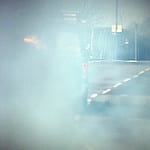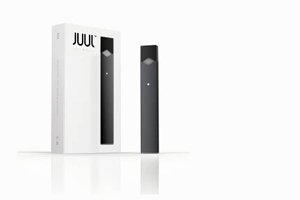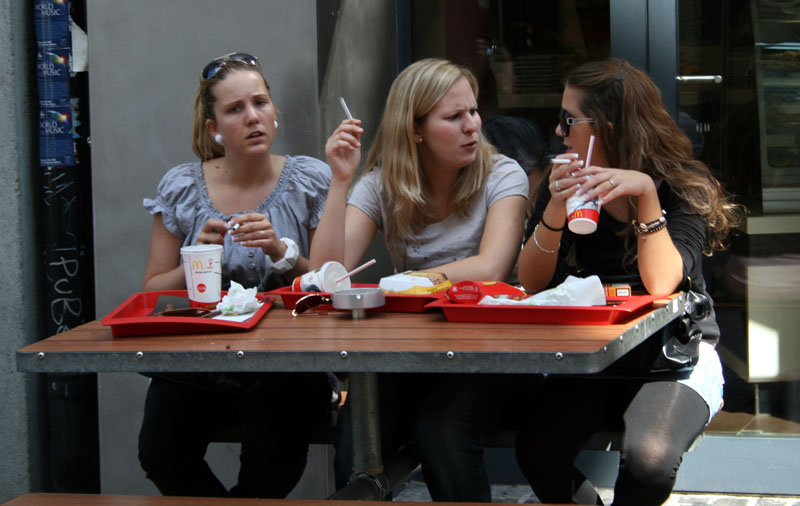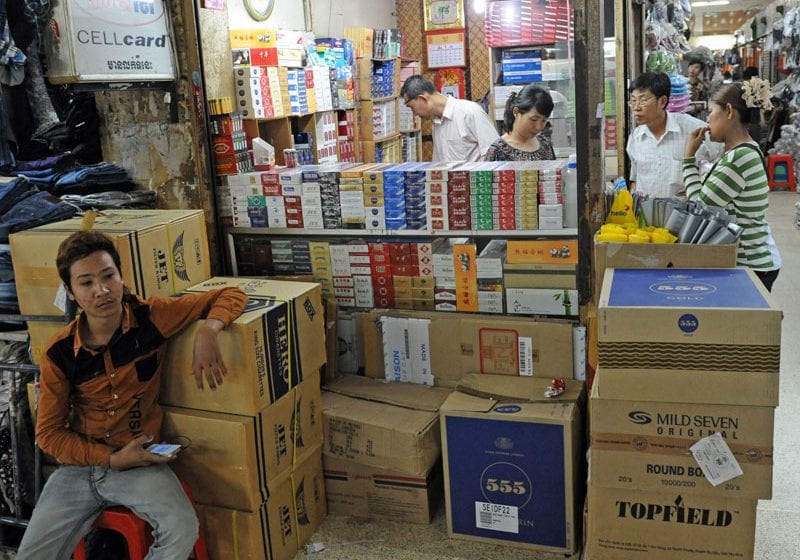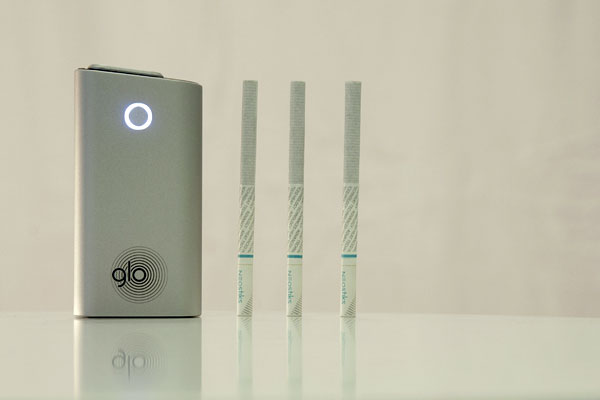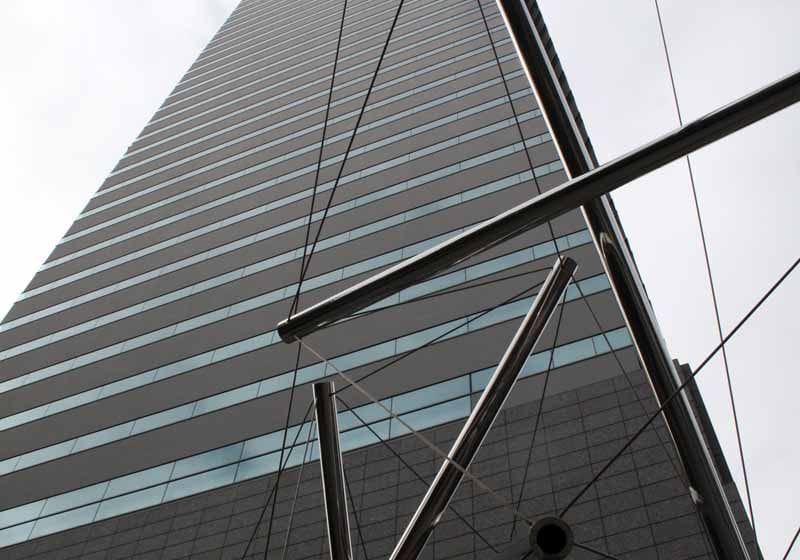Polluted air can be likened to cigarette smoke, and a new app can tell you how many cigarette-equivalents you are ‘smoking’ while walking through various cities of the world, according to a story by Martin Echenique for citylab.com.
Shit, I Smoke! was created by Brazil-born designer Marcelo Coelho and France-born app developer Amaury Martiny after they read a study that analyzed air pollution and its link with cigarette smoke.
The article, co-written by Richard Mueller, a MacArthur fellow and physics professor at the University of California, Berkeley, described a mathematical model that compared smoke and PM2.5 particles.
‘Here is the rule of thumb: one cigarette per day is the rough equivalent of a PM2.5 level of 22 μg/m3 (…),’ the study reads. ‘Of course, unlike cigarette smoking, the pollution reaches every age group.’
The study found that, in 2016, Beijing had on average a PM2.5 level of 85 μg/m3, which equates to four cigarettes a day, while Los Angeles County registered an average of half a cigarette a day, or 12 μg/m3.
Using the formula in the article, Coelho and Martiny designed an ad-free interface that uses live pollution data from hundreds of air quality stations in cities around the world and converts the station’s PM2.5 number into the number of cigarette-equivalents being inhaled by a person in real time.
“The interface is pretty straightforward: it geolocates your phone, connects to the database, and shows the number of cigarettes smoked that day,” Coelho was quoted as saying.
The app apparently reveals that Parisians can inhale the equivalent of between three and six cigarettes a day, while a person in Delhi could be ‘smoking’ up to 20 cigarettes on a bad day.
Category: People

Taxing pollution

Mountain retreat
The Taipei city government will impose a tobacco-smoking ban on Elephant Mountain starting May 1, according to a story in The Taiwan News.
The forthcoming ban was said to be the municipal government’s first legislation aimed at eliminating smoking from all mountain scenic areas.
Elephant Mountain attracts large numbers of visitors and international tourists daily, especially during New Year celebrations, and this is why it was chosen as the first location to impose the ban.
According to a government spokesman, the ban was created to protect the right of people not to breathe second-hand smoke.
Those who violate the ban will be fined NT$2,000-NT$10,000 (US$60-US$340).
Elephant Mountain is an ideal spot to take photos of the Taipei skyline and draws large crowds every day.
FDA comes down on JUUL
The Commissioner of the US Food and Drug Administration, Dr. Scott Gottlieb, said yesterday that the agency was introducing several enforcement actions as part of a new Youth Tobacco Prevention Plan to stop young people from using and gaining access to JUUL and other electronic cigarettes.
In a note issued through its Center for Tobacco Products, the FDA said it understood that many kids were using e-cigarettes with a particular set of characteristics: an appearance that closely resembled a USB flash drive, high levels of nicotine, and emissions that were hard to see. It said that these characteristics might facilitate youth use by making the products more attractive to children and teens.
Several of these products fell under the JUUL brand, but other brands with similar characteristics were emerging, it said.
As part of the Youth Tobacco Prevention Plan to stop youth use of tobacco products – particularly e-cigarettes – the FDA said it was announcing several new actions and efforts, including:- Issuing warning letters to 40 retailers for violations related to youth sales of JUUL e-cigarettes;
- Conducting a large-scale, undercover nationwide blitz of retail establishments;
- Sending an official request for information to JUUL Labs requiring the company to submit important documents to better understand the reportedly high rates of youth use and the particular youth appeal of these products; and
- Taking steps to foreclose online sales of JUUL to minors.
Finally, the FDA said that as part of the FDA’s responsibility to protect kids and significantly reduce tobacco-related disease and death, these were the first steps in a new effort aimed at stopping youth use of e-cigarettes.

Quitting record
Last year set a record for the number of people who quit smoking in the Netherlands: 110,000, according to a DutchNews.nl story citing new figures from the national statistics office CBS, compiled by the Trimbos addiction clinic.
The percentage of adult smokers in the population was said now to stand at 23.1 percent, but it was not said what the proportion was previously.
In addition to the quitters, tens of thousands of people are smoking less, the CBS said. The 2.35 million people who said they smoked every day was down by 170,000 on the figure for 2016.
About 27 percent of men say they smoke, of whom over 19 percent do so every day.
And just under 20 percent of women say they smoke, while 14.5 percent have at least one cigarette a day.
The Trimbos institute said it was notable that the biggest proportion of occasional smokers comprised young adults, with 32.6 percent of people aged 20 to 24 saying they smoked, but not every day.
Just under 20 percent of those aged 40 to 65 said they smoked on a daily basis.
Bans imposed
South Korean health authorities have announced plans to ban tobacco smoking at all cafés across the country from July, according to a story in The Korea Bizwire.
The Ministry of Health and Welfare is said to be set to pass an amendment to the National Health Promotion Act by the end of next month.
However, the ministry has said it will take into consideration public opinions submitted by May 30 before finalizing the reform bill.
Under the revised act, smoking would be banned even at cafés that now have smoking areas.
The new rule is scheduled to take effect in July in respect of cafés with floor areas bigger than 75 square meters.
Smaller establishments would be subject to the same rule from next year.
Currently, there are 30 smoking cafés across South Korea, with 13 of them located in Seoul and the surrounding area.
The amendment includes also a smoking ban in the vicinity of kindergartens and day-care centers, of which there are nearly 50,000.
The smoking rate among South Korean men aged 19 or older fell last year to below 40 percent for the first time, according to a survey released by the Korea Centers for Disease Control and Prevention last month.
Smoking in Vietnam
More than 45 percent of Vietnamese men smoke cigarettes, and many of them start smoking before the age of 20, according to a Xinhua News Agency story reporting on an anti-smoking conference held in Ho Chi Minh City yesterday.
The Vietnam Office of HealthBridge Foundation of Canada, was said to have told Xinhua that the Vietnam segment of a global adult tobacco survey conducted by Vietnamese and foreign agencies had put the over-15 smoking population at 15.6 million, 85.3 percent of whom smoked daily.
The survey found that 75.9 percent of smokers smoked at least 10 cigarettes a day, and 37.6 percent consumed at least 20.
Smokers annually spent about 31 trillion Vietnamese dong (nearly US$1.4 billion) on their habit.
And on average, men started smoking daily at the age of 18.8 years.
In 2010, the World Health Organization estimated that about 48 percent of men and about one percent of women smoked in Vietnam. And, according to the Xinhua story, the organization has projected that the rate will be 47 percent of men and one percent of women by 2025.
Meanwhile, the Ho Chi Minh City-based Vietnam Tobacco Association said that nearly one billion packs of smuggled cigarettes were consumed in Vietnam each year, causing ‘losses’ of about US$450 million to the state budget, and resulting in the loss of one million jobs for farmers and workers in the domestic tobacco industry.
Reduced risk on hold
British American Tobacco (Malaysia) has said it will not introduce electronic cigarettes or other reduced-harm products in Malaysia until they are the subject of clear regulations, according to a story in The Edge Financial Daily.
“We are a bit concerned that if we do introduce these products, the regulatory framework would not be as sharp as they should be,” BAT Malaysia MD Erik Stoel told a media briefing after the group’s annual general meeting on April 19.
Guidelines were needed on the excise duties and marketing restrictions that would apply to such products.
“Fundamentally, we think that if we can sell potentially reduced-harm products to consumers in Malaysia then we should,” he said, adding that it was the “right” thing to do.
BAT had launched glo, a tobacco-heating device, in Japan in May last year, and had a “very good product portfolio” in Europe’s strong vaping market, Stoel said.
In 2015, several states in Malaysia banned the sale of e-cigarettes after the National Fatwa (religious edict) Council ruled that vaping was forbidden in Islam.
Introducing such reduced-harm products might be the lifeline needed by tobacco companies in Malaysia, which have seen their market size and subsequently their earnings, squeezed by the market for illegal cigarettes.
Tabacalera acquired
In Costa Rica, a Philip Morris subsidiary, Mendiola & Company, has acquired 100 percent of Tabacalera, according to a story in The Costa Rican Times.
The Times said the ‘merger’ would mean that 45 of the company’s [presumably Tabacalera’s] 200 employees would be laid off.
Additionally, Tabacalera would stop producing cigarettes in Costa Rica, apparently because of increases in the tax burden and the illegal trade.
The tax increases were apparently imposed in 2012.
Illegal smuggling is said to have led to revenue losses of $26 million annually.
The workers who are laid off are said to be due to receive the benefits due to them under the law as well as additional benefits, such as psychological, financial and legal counseling for 12 months. They can access help in developing CVs, interview techniques and advise on starting businesses.
E-cig crackdown coming
The US Food and Drug Administration will step up its crackdown on electronic cigarette sales to teens, according to a story by Robert King for the Washington Examiner quoting the head of the agency.
Lawmakers on a House Appropriations subcommittee were said to have grilled FDA Commissioner Scott Gottlieb about ‘excessive’ use of e-cigarettes among young people.
The FDA has the authority ‘to go after’ e-cigarette makers and retailers if they violate a ban on sales to people under 18, but lawmakers questioned if the agency was doing enough.
“I am concerned that FDA’s silence on e-cigarettes could open the door to the next public health emergency,” said Rep. Nita Lowey, D-N.Y.
Gottlieb replied that the FDA would crack down on young people’s use of e-cigarettes in the coming weeks.
The agency has several avenues for targeting retailers that are selling to minors. Those include a warning letter, massive fines, or banning the retailer from selling any tobacco or e-cigarettes.
Gottlieb said e-cigarettes could offer fewer health risks than traditional cigarettes, but the soaring use among minors was worrisome. A recent study had found that e-cigarette use grew by 900 percent among high school students from 2011 to 2015 [there was no mention of the level of use in 2011].
“We can’t just addict a whole generation of young people onto nicotine,” Gottlieb reportedly said.
Elevating passive smoking
The Ikoma city government in the Nara Prefecture of Japan is forcing smokers to undergo a ‘decontamination’ period before they can enter elevators, a health rule praised by some but described as draconian by others, according to a story in The Asahi Shimbun.
Workers and visitors to the city government’s offices must wait for 45 minutes after they smoke if they want to use elevators on the grounds that ‘exhaled air from smokers could cause passive smoking’, and because the impact of such passive smoking ‘is especially serious in closed spaces’.
The elevator policy started this month.
Violators face no specific penalties, but the city government is asking even visitors to abide by the rule.
Hiroshi Yamato, a health development professor at the University of Occupational and Environmental Health, Japan, believes the move will protect the health of non-smoking elevator riders. It was his research that led to Ikoma’s elevator policy.
One reason for the elevator policy is that the Ikoma city government is getting tough with smokers generally.
Starting in June, the city will impose an administrative fine of 20,000 yen ($187) on those who smoke on public roads around Kintetsu Ikoma Station.
‘City officials must actively engage in countermeasures against the issue of second-hand smoke because the burden is put on the citizens,’ according to the Ikoma government.
A law introduced in 2003 stipulates that proper countermeasures should be taken to prevent second-hand smoke negatively impacting health. The legislation was the first of its kind in Japan.
The story said it was estimated that 15,000 people died each year in Japan of heart attacks, lung cancer and brain and other diseases caused by passive smoking.

